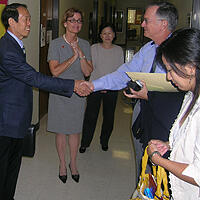For more articles and documents on aging, click here.
By Athan Bezaitis
This article was originally published by the USC News Service on Sept. 27, 2006. Photo: Zhao Baohua, vice director of the China National Committee on Aging, shakes hands with Jon Pynoos, professor at the USC Leonard Davis School of Gerontology.
The USC School of Social Work hosted a group of nine officials from the China National Committee on Aging.
The visitors were welcomed Sept. 25 to the USC Leonard Davis School of Gerontology by Zhen Cong, a Chinese-speaking representative of the office of professor Merril Silverstein, who conducts research on aging in China.
“We were happy to welcome such an important delegation,” Silverstein said. “We hope to collaborate in the future.”
Silverstein’s most recent article, published in the current issue of the Journal of Gerontology, discusses the psychological well-being of elders in rural areas of China whose working-age children have migrated to urban centers.
Zhao Baohua, vice director of the China National Committee on Aging, was holding a copy of Silverstein’s work in his hand when he addressed the small group that gathered at the USC Davis School library.
“USC has been well-known and admired in China. We feel very honored to be here,” he said.
The China National Committee on Aging performs scientific research on aging in order to suggest policy for the Chinese government. In spite of a population of approximately 1.3 billion people, China has declining fertility rates because of family planning policies in urban centers that encourage people to have as few children as possible. This phenomenon created a four-two-one family structure (four grandparents, two parents and one child) with powerful ramifications on the future of Chinese society.
“There is a great burden with fewer children to support elders,” said Cong, a Ph.D. candidate and contributing author to Silverstein’s study.
A comparable population shift toward elders also exists in the United States with the coming of age of the baby boomers – the generation of people born between the years 1946 to 1964. The oldest members of this group are turning 60 this year and make up approximately one-third of the population.
“Both the United States and China have similar interests,” said Iris Chi, professor of social work and gerontology, who holds the Golden Age Association Francis Wu Chair for the Chinese Elderly.
Chi hosted the dignitaries for lunch at the University Club after their tour of the USC Davis School, where they were joined by instructors from the USC School for Policy, Planning, and Development, the USC School of Pharmacy, the USC Rossier School of Education, the USC Davis School and members of the RAND Corp.
“The meeting was a real success,” Chi said. “The committee will be sending more delegates representing the research staff to come at the end of November.”
More articles and documents on aging:
As China Ages: Elderly Health Outcomes and Socioeconomic Status | Social support, social change, and psychological well-being of the elderly in China: Does the type and source of support matter? | An elderly perspective: A case study of elderly residents' preferences and opinions on housing in various communities in Beijing | The Health and Well-Being of the Elderly in China: Evidence from the China Health and Retirement Longitudinal Study (CHARLS) | China Trip Offers Wisdom on Aging | Intergenerational social support and the psychological well-being of older parents in China | Delegates Discuss Aging in China | Grant to Yield More Study on Elderly | A Profile of the Chinese Aged Population: Results from 2000 and 2006 National Surveys | Aging in China Covered During USC Visit




